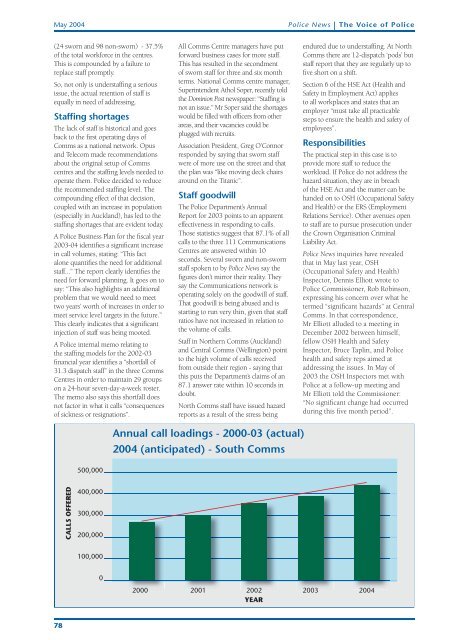Police News May - New Zealand Police Association
Police News May - New Zealand Police Association
Police News May - New Zealand Police Association
Create successful ePaper yourself
Turn your PDF publications into a flip-book with our unique Google optimized e-Paper software.
<strong>May</strong> 2004 <strong>Police</strong> <strong><strong>New</strong>s</strong> The Voice of <strong>Police</strong>(24 sworn and 98 non-sworn) - 37.5%of the total workforce in the centres.This is compounded by a failure toreplace staff promptly.So, not only is understaffing a seriousissue, the actual retention of staff isequally in need of addressing.Staffing shortagesThe lack of staff is historical and goesback to the first operating days ofComms as a national network. Opusand Telecom made recommendationsabout the original setup of Commscentres and the staffing levels needed tooperate them. <strong>Police</strong> decided to reducethe recommended staffing level. Thecompounding effect of that decision,coupled with an increase in population(especially in Auckland), has led to thestaffing shortages that are evident today.A <strong>Police</strong> Business Plan for the fiscal year2003-04 identifies a significant increasein call volumes, stating: “This factalone quantifies the need for additionalstaff...” The report clearly identifies theneed for forward planning. It goes on tosay: “This also highlights an additionalproblem that we would need to meettwo years’ worth of increases in order tomeet service level targets in the future.”This clearly indicates that a significantinjection of staff was being mooted.A <strong>Police</strong> internal memo relating tothe staffing models for the 2002-03financial year identifies a “shortfall of31.3 dispatch staff” in the three CommsCentres in order to maintain 29 groupson a 24-hour seven-day-a-week roster.The memo also says this shortfall doesnot factor in what it calls “consequencesof sickness or resignations”.All Comms Centre managers have putforward business cases for more staff.This has resulted in the secondmentof sworn staff for three and six monthterms. National Comms centre manager,Superintendent Athol Soper, recently toldthe Dominion Post newspaper: “Staffing isnot an issue.” Mr Soper said the shortageswould be filled with officers from otherareas, and their vacancies could beplugged with recruits.<strong>Association</strong> President, Greg O’Connorresponded by saying that sworn staffwere of more use on the street and thatthe plan was “like moving deck chairsaround on the Titanic”.Staff goodwillThe <strong>Police</strong> Department’s AnnualReport for 2003 points to an apparenteffectiveness in responding to calls.Those statistics suggest that 87.1% of allcalls to the three 111 CommunicationsCentres are answered within 10seconds. Several sworn and non-swornstaff spoken to by <strong>Police</strong> <strong><strong>New</strong>s</strong> say thefigures don’t mirror their reality. Theysay the Communications network isoperating solely on the goodwill of staff.That goodwill is being abused and isstarting to run very thin, given that staffratios have not increased in relation tothe volume of calls.Staff in Northern Comms (Auckland)and Central Comms (Wellington) pointto the high volume of calls receivedfrom outside their region - saying thatthis puts the Department’s claims of an87.1 answer rate within 10 seconds indoubt.North Comms staff have issued hazardreports as a result of the stress beingendured due to understaffing. At NorthComms there are 12-dispatch ‘pods’ butstaff report that they are regularly up tofive short on a shift.Section 6 of the HSE Act (Health andSafety in Employment Act) appliesto all workplaces and states that anemployer “must take all practicablesteps to ensure the health and safety ofemployees”.ResponsibilitiesThe practical step in this case is toprovide more staff to reduce theworkload. If <strong>Police</strong> do not address thehazard situation, they are in breachof the HSE Act and the matter can behanded on to OSH (Occupational Safetyand Health) or the ERS (EmploymentRelations Service). Other avenues opento staff are to pursue prosecution underthe Crown Organisation CriminalLiability Act.<strong>Police</strong> <strong><strong>New</strong>s</strong> inquiries have revealedthat in <strong>May</strong> last year, OSH(Occupational Safety and Health)Inspector, Dennis Elliott wrote to<strong>Police</strong> Commissioner, Rob Robinson,expressing his concern over what hetermed “significant hazards” at CentralComms. In that correspondence,Mr Elliott alluded to a meeting inDecember 2002 between himself,fellow OSH Health and SafetyInspector, Bruce Taplin, and <strong>Police</strong>health and safety reps aimed ataddressing the issues. In <strong>May</strong> of2003 the OSH Inspectors met with<strong>Police</strong> at a follow-up meeting andMr Elliott told the Commissioner:“No significant change had occurredduring this five month period”.Annual call loadings - 2000-03 (actual)2004 (anticipated) - South Comms500,000CALLS OFFERED400,000300,000200,000100,00002000 2001 2002 2003 2004YEAR78
















